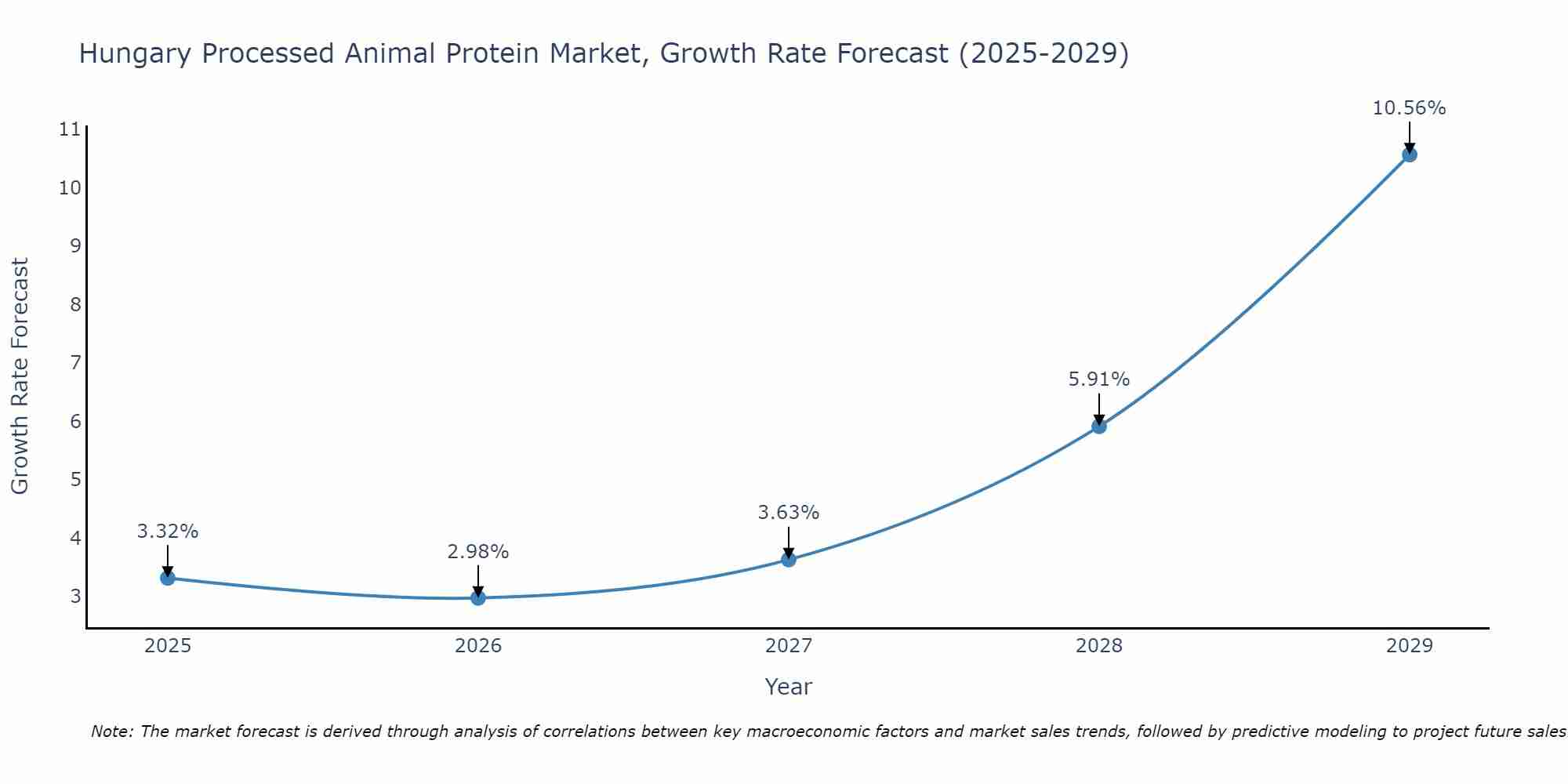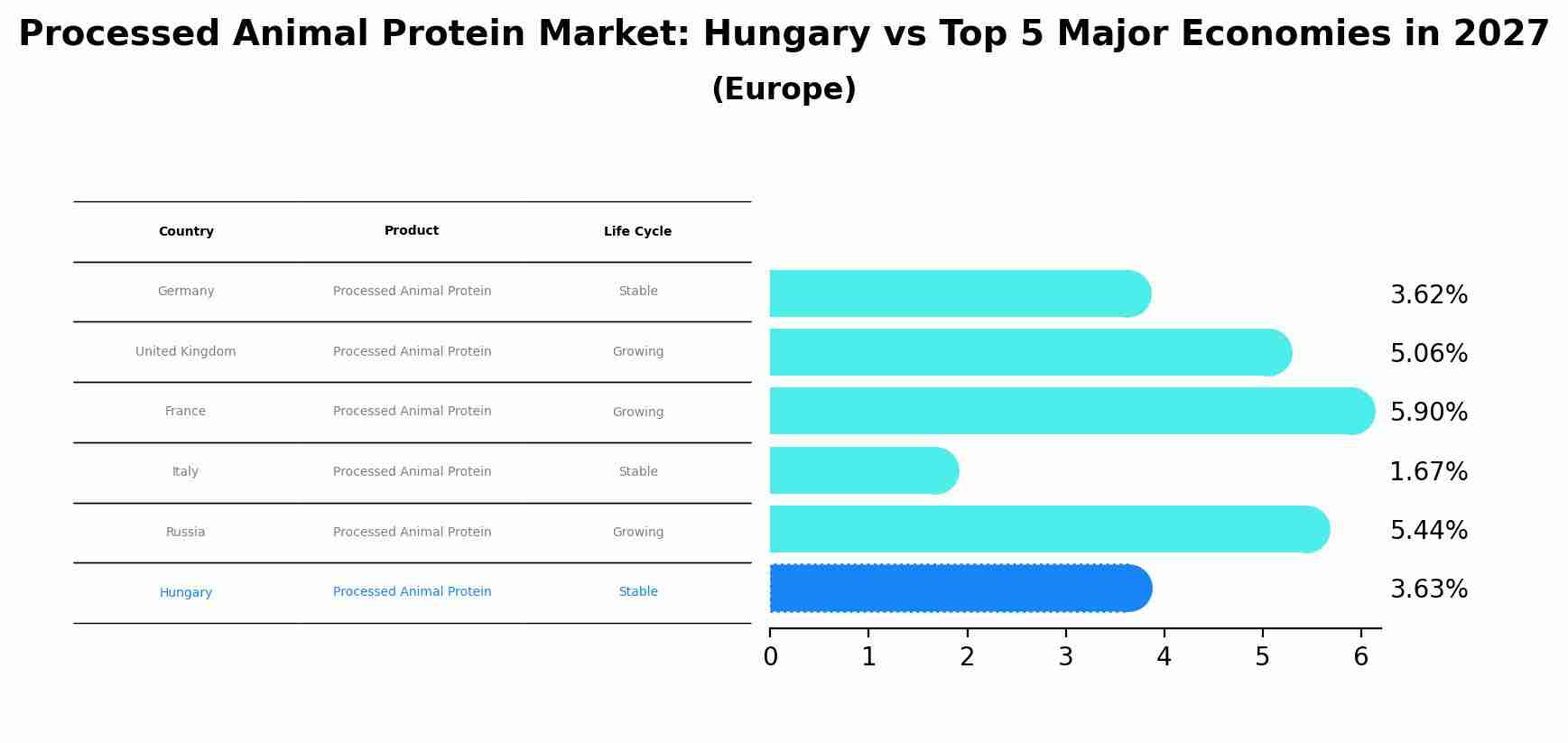Hungary Processed Animal Protein Market Outlook | Forecast, Companies, Value, Trends, Analysis, Industry, Size, Revenue, Share, Growth & COVID-19 IMPACT
| Product Code: ETC411915 | Publication Date: Oct 2022 | Updated Date: Jul 2025 | Product Type: Market Research Report | |
| Publisher: 6Wresearch | Author: Sachin Kumar Rai | No. of Pages: 75 | No. of Figures: 35 | No. of Tables: 20 |
Hungary Processed Animal Protein Market Size Growth Rate
The Hungary Processed Animal Protein Market is projected to witness mixed growth rate patterns during 2025 to 2029. From 3.32% in 2025, the growth rate steadily ascends to 10.56% in 2029.

Processed Animal Protein Market: Hungary vs Top 5 Major Economies in 2027 (Europe)
In the Europe region, the Processed Animal Protein market in Hungary is projected to expand at a stable growth rate of 3.63% by 2027. The largest economy is Germany, followed by United Kingdom, France, Italy and Russia.

Hungary Processed Animal Protein Market Synopsis
The Hungary processed animal protein market is characterized by a growing demand for high-quality meat products due to changing consumer preferences towards protein-rich diets. The market is driven by factors such as increasing disposable income, urbanization, and a rising awareness of the nutritional benefits of animal proteins. Key players in the market focus on product innovation, quality assurance, and sustainable sourcing practices to meet consumer expectations. Poultry, pork, and beef are the dominant sources of processed animal protein in Hungary, with a variety of products including sausages, cold cuts, and canned meats being popular among consumers. The market is also witnessing a trend towards healthier and more convenient animal protein products, driving the demand for organic and ready-to-eat options.
Hungary Processed Animal Protein Market Trends
In the Hungary Processed Animal Protein Market, there is a growing demand for premium quality products, driven by consumers` increasing focus on health and nutrition. The market is witnessing a shift towards cleaner labels and products that are free from additives and artificial ingredients. Additionally, there is a rising interest in sustainable and organic processed animal proteins, reflecting consumers` concern for animal welfare and environmental sustainability. Plant-based alternatives are also gaining traction in the market, appealing to health-conscious consumers and those following vegetarian or flexitarian diets. Manufacturers are innovating to meet these evolving consumer preferences by introducing new product offerings and investing in sustainable production practices to stay competitive in the market.
Hungary Processed Animal Protein Market Challenges
In the Hungary Processed Animal Protein Market, some key challenges include regulatory constraints and changing consumer preferences. Stricter regulations regarding the sourcing, processing, and labeling of animal protein products can impact the industry by increasing compliance costs and limiting market access for some companies. Additionally, as consumer preferences shift towards plant-based alternatives and healthier protein sources, the demand for processed animal protein products may fluctuate. This requires companies in the market to innovate and adapt their product offerings to meet changing consumer needs while also maintaining cost-efficiency and profitability. Overall, navigating these regulatory and consumer-driven challenges is crucial for companies operating in the Hungary Processed Animal Protein Market to sustain growth and competitiveness.
Hungary Processed Animal Protein Market Investment Opportunities
In the Hungary Processed Animal Protein Market, there are several investment opportunities worth considering. One potential avenue is investing in companies that specialize in producing pet food, as the demand for high-quality pet nutrition products is increasing. Additionally, investing in companies focusing on innovative processing technologies for animal protein can be lucrative, as advancements in this field can lead to cost efficiency and improved product quality. Another opportunity lies in investing in companies that cater to the growing trend of sustainable and ethical animal protein production, as consumers are becoming more conscious about the environmental and ethical implications of their food choices. Overall, the Hungary Processed Animal Protein Market offers diverse investment opportunities that cater to the evolving needs and preferences of both consumers and the industry.
Jordan Agar Market Government Policies
Government policies related to the Hungary Processed Animal Protein Market focus on ensuring food safety and quality standards. The Hungarian government has implemented regulations that govern the production, processing, and labeling of animal protein products to safeguard consumer health. These policies include strict inspections of processing plants, traceability requirements for animal feed sources, and adherence to EU food safety regulations. Additionally, subsidies and financial support are provided to promote the development of the domestic animal protein industry and encourage innovation in processing technologies. Overall, the government aims to maintain high standards of quality and safety in the processed animal protein market to protect consumer interests and support the growth of the industry.
Hungary Processed Animal Protein Market Future Outlook
The future outlook for the Hungary Processed Animal Protein Market appears positive, driven by factors such as increasing demand for high-protein animal feed, growth in the livestock industry, and rising consumer preference for protein-rich diets. The market is expected to witness steady growth due to the expanding food and beverage sector and the rising popularity of convenience food products. Additionally, advancements in processing technologies and increasing investments in research and development are likely to further propel market growth. However, challenges related to regulatory issues and sustainability concerns may impact market dynamics. Overall, with the increasing focus on food security and sustainable agricultural practices, the Hungary Processed Animal Protein Market is anticipated to show promising growth opportunities in the coming years.
Key Highlights of the Report:
- Hungary Processed Animal Protein Market Outlook
- Market Size of Hungary Processed Animal Protein Market, 2021
- Forecast of Hungary Processed Animal Protein Market, 2031
- Historical Data and Forecast of Hungary Processed Animal Protein Revenues & Volume for the Period 2018 - 2031
- Hungary Processed Animal Protein Market Trend Evolution
- Hungary Processed Animal Protein Market Drivers and Challenges
- Hungary Processed Animal Protein Price Trends
- Hungary Processed Animal Protein Porter's Five Forces
- Hungary Processed Animal Protein Industry Life Cycle
- Historical Data and Forecast of Hungary Processed Animal Protein Market Revenues & Volume By Source for the Period 2018 - 2031
- Historical Data and Forecast of Hungary Processed Animal Protein Market Revenues & Volume By Poultry for the Period 2018 - 2031
- Historical Data and Forecast of Hungary Processed Animal Protein Market Revenues & Volume By Pork for the Period 2018 - 2031
- Historical Data and Forecast of Hungary Processed Animal Protein Market Revenues & Volume By Beef for the Period 2018 - 2031
- Historical Data and Forecast of Hungary Processed Animal Protein Market Revenues & Volume By Others for the Period 2018 - 2031
- Historical Data and Forecast of Hungary Processed Animal Protein Market Revenues & Volume By Form for the Period 2018 - 2031
- Historical Data and Forecast of Hungary Processed Animal Protein Market Revenues & Volume By Dry for the Period 2018 - 2031
- Historical Data and Forecast of Hungary Processed Animal Protein Market Revenues & Volume By Liquid for the Period 2018 - 2031
- Hungary Processed Animal Protein Import Export Trade Statistics
- Market Opportunity Assessment By Source
- Market Opportunity Assessment By Form
- Hungary Processed Animal Protein Top Companies Market Share
- Hungary Processed Animal Protein Competitive Benchmarking By Technical and Operational Parameters
- Hungary Processed Animal Protein Company Profiles
- Hungary Processed Animal Protein Key Strategic Recommendations
Frequently Asked Questions About the Market Study (FAQs):
- Single User License$ 1,995
- Department License$ 2,400
- Site License$ 3,120
- Global License$ 3,795
Search
Related Reports
- Vietnam System Integrator Market (2025-2031) | Size, Companies, Analysis, Industry, Value, Forecast, Growth, Trends, Revenue & Share
- ASEAN and Thailand Brain Health Supplements Market (2025-2031) | Strategy, Consumer Insights, Analysis, Investment Trends, Opportunities, Growth, Size, Share, Industry, Revenue, Segments, Value, Segmentation, Supply, Forecast, Restraints, Outlook, Competition, Drivers, Trends, Demand, Pricing Analysis, Competitive, Strategic Insights, Companies, Challenges
- ASEAN Bearings Market (2025-2031) | Strategy, Consumer Insights, Analysis, Investment Trends, Opportunities, Growth, Size, Share, Industry, Revenue, Segments, Value, Segmentation, Supply, Forecast, Restraints, Outlook, Competition, Drivers, Trends, Demand, Pricing Analysis, Competitive, Strategic Insights, Companies, Challenges
- Europe Flooring Market (2025-2031) | Outlook, Share, Industry, Trends, Forecast, Companies, Revenue, Size, Analysis, Growth & Value
- Saudi Arabia Manlift Market (2025-2031) | Outlook, Size, Growth, Trends, Companies, Industry, Revenue, Value, Share, Forecast & Analysis
- Uganda Excavator, Crane, and Wheel Loaders Market (2025-2031) | Strategy, Consumer Insights, Analysis, Investment Trends, Opportunities, Growth, Size, Share, Industry, Revenue, Segments, Value, Segmentation, Supply, Forecast, Restraints, Outlook, Competition, Drivers, Trends, Demand, Pricing Analysis, Competitive, Strategic Insights, Companies, Challenges
- Rwanda Excavator, Crane, and Wheel Loaders Market (2025-2031) | Strategy, Consumer Insights, Analysis, Investment Trends, Opportunities, Growth, Size, Share, Industry, Revenue, Segments, Value, Segmentation, Supply, Forecast, Restraints, Outlook, Competition, Drivers, Trends, Demand, Pricing Analysis, Competitive, Strategic Insights, Companies, Challenges
- Kenya Excavator, Crane, and Wheel Loaders Market (2025-2031) | Strategy, Consumer Insights, Analysis, Investment Trends, Opportunities, Growth, Size, Share, Industry, Revenue, Segments, Value, Segmentation, Supply, Forecast, Restraints, Outlook, Competition, Drivers, Trends, Demand, Pricing Analysis, Competitive, Strategic Insights, Companies, Challenges
- Angola Excavator, Crane, and Wheel Loaders Market (2025-2031) | Strategy, Consumer Insights, Analysis, Investment Trends, Opportunities, Growth, Size, Share, Industry, Revenue, Segments, Value, Segmentation, Supply, Forecast, Restraints, Outlook, Competition, Drivers, Trends, Demand, Pricing Analysis, Competitive, Strategic Insights, Companies, Challenges
- Israel Intelligent Transport System Market (2025-2031) | Strategy, Consumer Insights, Analysis, Investment Trends, Opportunities, Growth, Size, Share, Industry, Revenue, Segments, Value, Segmentation, Supply, Forecast, Restraints, Outlook, Competition, Drivers, Trends, Demand, Pricing Analysis, Competitive, Strategic Insights, Companies, Challenges
Industry Events and Analyst Meet
Our Clients
Whitepaper
- Middle East & Africa Commercial Security Market Click here to view more.
- Middle East & Africa Fire Safety Systems & Equipment Market Click here to view more.
- GCC Drone Market Click here to view more.
- Middle East Lighting Fixture Market Click here to view more.
- GCC Physical & Perimeter Security Market Click here to view more.
6WResearch In News
- Doha a strategic location for EV manufacturing hub: IPA Qatar
- Demand for luxury TVs surging in the GCC, says Samsung
- Empowering Growth: The Thriving Journey of Bangladesh’s Cable Industry
- Demand for luxury TVs surging in the GCC, says Samsung
- Video call with a traditional healer? Once unthinkable, it’s now common in South Africa
- Intelligent Buildings To Smooth GCC’s Path To Net Zero













